|
|
|
Sort Order |
|
|
|
Items / Page
|
|
|
|
|
|
|
| Srl | Item |
| 1 |
ID:
145884


|
|
|
|
|
| Summary/Abstract |
Ideological campaigns in post-Deng China have a strategic function of discerning loyalties of local leaders. Previous empirical studies have found that Jiang Zemin’s followers are more likely to echo Jiang’s ideological campaigns. Through a content analysis of provincial newspapers between 2005 and 2012, this study suggests that the manner of displaying loyalties has completely changed. By employing a panel-corrected standard errors (PCSE) estimation, this study finds that protégés of both Hu Jintao and Jiang Zemin are less likely to echo their patron’s ideological campaigns, suggesting the shifting function of ideological campaigns from monitoring identified followers’ loyalties to recruiting new followers. This article argues that this is a result of changing elite politics and—more importantly—the different strategic use of ideological campaigns.
|
|
|
|
|
|
|
|
|
|
|
|
|
|
|
|
| 2 |
ID:
145888
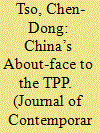

|
|
|
|
|
| Summary/Abstract |
When the US restarted the Trans Pacific Partnership (TPP) in 2009, speculation arose as to whether China would compete against it or cooperate by becoming a TPP member. Between 2010 and 2013, China shifted in stance from competition to cooperation in meeting the TPP challenge. By looking at both the economic and security dimensions, this article argues that China’s economic concern determines whether to react and its security concern determines the direction in which China reacts. Between 2010 and 2012 when security pressure was overwhelming and economic concern was not formidable, counterbalance was inevitable. In 2013, when anxiety over security pressure calmed down and economic concern grew more threatening, bandwagon became possible. This finding challenges the classical theory of the domino effect by pinpointing the importance of security consideration in where the free trade agreements (FTA) proliferation heads to. It also supplements the emulation–competition dichotomy by highlighting that whether the FTA initiator is considered a threat or a model is not fixed but contingent upon the initiator’s changing relation with the responding nation.
|
|
|
|
|
|
|
|
|
|
|
|
|
|
|
|
| 3 |
ID:
145887
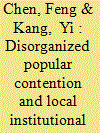

|
|
|
|
|
| Summary/Abstract |
Concurring with the approach stressing the role of contentious politics in (re)shaping state institutions, this study explores how disorganized popular contentions configure local institutional building in China. As Chinese citizens are not legally allowed to take organized collective action to express their grievances and demands, popular contentions, despite their common origins, similar claims and identical targets, break out here and there in large numbers without clear organizational shape. This compels the government to build institutions able to map scattered conflicts, detect potential problems and defuse them on a case-by-case basis in a timely fashion. Such a dissipative approach is distinguished, by its purpose, format and mechanism, from two common types of state responses to popular contentions—incorporation and repression—which are typically linked to democracies and authoritarian developing states where popular contentions are often organized in various ways.
|
|
|
|
|
|
|
|
|
|
|
|
|
|
|
|
| 4 |
ID:
145889
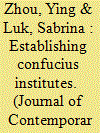

|
|
|
|
|
| Summary/Abstract |
Soft power has become China’s new diplomatic tool to spread its influence in today’s changing international landscape. The establishment of Confucius Institutes (CIs) since 2004 to promote the understanding of Chinese language and culture is a striking example of how the government promotes soft power through cultural means. Through the macro- and micro-level analysis of CIs, this study shows that CIs fail to increase the soft power of China because many countries regard CIs as a propaganda tool and a threat to academic freedom and the local community. It shows that China’s soft power is not so attractive in the eyes of receivers. In fact, China’s aggressive cultural initiatives through the establishment of CIs have triggered another version of the ‘China threat’.
|
|
|
|
|
|
|
|
|
|
|
|
|
|
|
|
| 5 |
ID:
145882
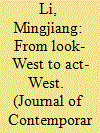

|
|
|
|
|
| Summary/Abstract |
China has been quite successful in developing its relations with Central Asian states and expanding its influence in the region since the 1990s. Most analysts contribute the success to the strategy and policy of China’s national central government. This observation certainly has a lot of truth, but at the same time we should not neglect or downplay the role that the local government in Xinjiang has played in cementing China–Central Asian ties. Xinjiang has functioned as an indispensable actor in China’s look-west and act-west policies towards Central Asia and beyond. With Chinese foreign policy elites increasingly interested in using the act-west policy as part of their counter-hedging strategy in Asia, Xinjiang appears to enjoy many more opportunities and play an even more significant role in China’s relations with countries in its western flank.
|
|
|
|
|
|
|
|
|
|
|
|
|
|
|
|
| 6 |
ID:
145880
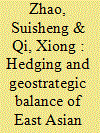

|
|
|
|
|
| Summary/Abstract |
While most East Asian countries have opted for a hedge strategy to preserve a maximum range of strategic options in response to the rise of China, some countries have engaged in geostrategic balance through collective bargaining and strategic alignments with the US and with each other. The divergent threat perceptions and complicated historical animosities among East Asian countries, however, have set a limitation on the geostrategic balance. Therefore, to bandwagon with China could be a realistic choice for many countries. Historically, the most successful rising powers have been those which attracted the greatest number of bandwagoners. China cannot rise successfully without winning the support of its Asian neighbors. The long term peace and stability in the region, therefore, depends not only on whether China’s neighbors can work together to balance China but also whether China can balance its relationships in its own backyard so that its neighbors find bandwagoning a positive choice.
|
|
|
|
|
|
|
|
|
|
|
|
|
|
|
|
| 7 |
ID:
145881


|
|
|
|
|
| Summary/Abstract |
The extant literature on alignment behavior has focused primarily on the macro dimensions, i.e. the typology, manifestations and implications of states’ alignment choices vis-à-vis the great power(s). Relatively few studies have examined the micro aspects of alignment choices. This article attempts to fill in the gap by unpacking the constituent component of weaker states’ alignment decisions, with a focus on ASEAN states’ hedging behavior in the face of a rising China in the post-Cold War era. It contends that the enduring uncertainty at the systemic level has compelled the states to hedge by pursuing contradictory, mutually counteracting transactions of ‘returns-maximizing’ and ‘risk-contingency’ options, which seek to offset the potential drawbacks of one another, as a way to project a non-taking-sides stance while keeping their own fallback position at a time when the prospect of power structure is far from clear.
|
|
|
|
|
|
|
|
|
|
|
|
|
|
|
|
| 8 |
ID:
145883


|
|
|
|
|
| Summary/Abstract |
The level or rank of an administrative division (行区等级 or 政区级别) in China—a structural condition of the sub-national territorial administrative system—is a correlate of administrative rank (行政级别). State reterritorialization of the administrative divisions (行政区划), through establishment and expansion of hundreds of cities, introduces a political economy of differentiation and change by which city governments take the measure of their administrative reach and economic capacity. How do changes to the administrative divisions involve administrative rank, economic status and territorial governing power? In Suzhou, a prefecture-level city, incommensurability between the economic status of the city and its administrative rank reveals how ‘unfair’ rank in the administrative hierarchy becomes implicated in negotiations over territorial adjustments and cadre appointments, leading to creative forms of rank adjustment. Dynamics of the administrative divisions reflect rank consciousness, influence official positions and structure urban transformation in contemporary China.
|
|
|
|
|
|
|
|
|
|
|
|
|
|
|
|
| 9 |
ID:
145885


|
|
|
|
|
| Summary/Abstract |
The right to education for children from rural migrant families in urban areas has sparked heated debates in China. While there are increasing indications of policy changes to bring public education to all citizens regardless of their residency, it is less clear what kinds of resources are needed to create an education supply to serve this constantly moving and ever-growing population. Using archival and interview data on a large urban district in Shanghai, the authors analyze the constraints faced by local government in providing full-scale free education to migrant children. The authors find that the public finance scheme, teacher staffing policy and land use policy are the three factors that constrain the supply of public education in large metropolitan areas. This analysis also shows that under the current decentralized management scheme, local government alone does not have the capacity to resolve these constraints. This finding calls for coordination among various state branches at the national level.
|
|
|
|
|
|
|
|
|
|
|
|
|
|
|
|
| 10 |
ID:
145886


|
|
|
|
|
| Summary/Abstract |
Using data from a 2011 national household survey, this study examines the factors shaping urban residents’ prejudice toward rural-to-urban migrants and the impacts of prejudice on rural migrants’ integration into urban communities. The author addresses the endogeneity of the prejudice variable by employing an instrumental variable method. The results show that urban residents with higher education and household income report stronger prejudice. Also, urban residents with urban hukou at birth are more prejudiced toward rural migrants. Given that hukou status at birth is tied to parental hukou status, this result implies that prejudice can be transferred across generations. With regards to rural migrants’ integration into urban communities, high levels of prejudice in one’s current county of residence reduces perceived social standing of rural migrants and increases the number of livelihood problems they encounter. The author also conducts a falsification test, which provides support that the effect of urban residents’ prejudice on rural migrants’ integration is causal.
|
|
|
|
|
|
|
|
|
|
|
|
|
|
|
|
|
|
|
|
|